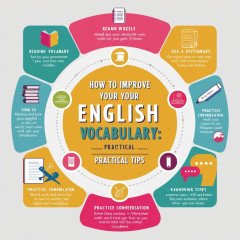English Learning Tips
English Learning Tips

Building a strong English vocabulary is one of the most powerful ways to improve your language skills and enhance your ability to communicate effectively. A rich vocabulary allows you to express ideas clearly and with nuance, making your conversations and writing more engaging. But how do you expand your vocabulary effectively? Here are some practical tips for mastering new words in English.
Read Regularly: One of the best ways to improve your vocabulary is to read extensively in English. By exposing yourself to a wide variety of texts—books, news articles, blogs, and academic papers—you naturally encounter new words and phrases. Websites like FluentU provide immersive learning tools that use video content with subtitles to introduce you to new vocabulary in real-life contexts. Watching movies, TV shows, or YouTube videos in English is also a great way to hear words in different accents and tones, improving both your listening and vocabulary skills.
Use Flashcards: Flashcards are a time-tested method for reinforcing new vocabulary. By writing down new words and reviewing them regularly, you can retain them better. Flashcard apps like Anki or Quizlet allow you to create digital flashcards that you can carry with you on your phone, making it easy to practice on the go. These apps often use spaced repetition, a technique proven to help learners retain information over time.
Learn Vocabulary in Context: Instead of memorizing lists of words, try to learn vocabulary in context. For example, when you learn a new word, see how it’s used in sentences. This will not only help you understand the word’s meaning but also teach you how to use it correctly in conversation or writing. Websites like Merriam-Webster offer example sentences for most words, making it easier to understand how they fit into different contexts. Additionally, try using the new words in your own sentences to practice.
Practice Writing and Speaking: The key to keeping new vocabulary in your long-term memory is to use it frequently. Practice speaking and writing in English as much as possible. Join language exchange platforms such as Tandem or HelloTalk where you can practice conversing with native speakers. Additionally, writing essays, stories, or keeping a journal in English can be a great way to incorporate new words into your daily use. The more you practice, the more naturally new vocabulary will become part of your active vocabulary.
Use Technology: Technology has made language learning easier and more accessible. Apps like Duolingo, Memrise, and Babbel are designed to help learners expand their vocabulary through interactive exercises and quizzes. Many of these apps provide vocabulary lessons based on topics such as travel, food, business, and more, allowing learners to tailor their vocabulary practice to their personal interests.
In conclusion, expanding your English vocabulary takes time and consistent effort, but with the right resources and practice strategies, anyone can do it. By reading, using flashcards, learning in context, practicing regularly, and leveraging technology, you’ll be well on your way to mastering a wide range of English vocabulary.
English Learning Tips
Read widely and regularly
How to Improve Your English Vocabulary Every Day